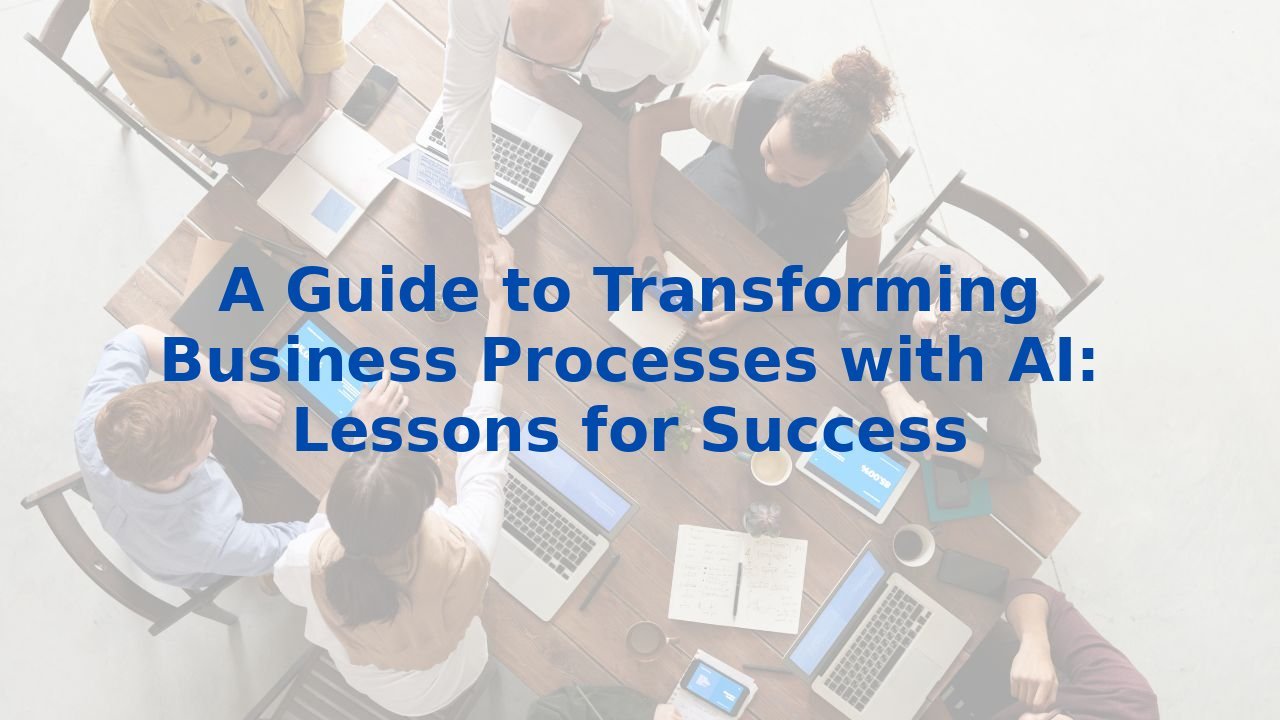A Guide to Transforming Business Processes with AI: Lessons for Success
A Guide to Transforming Business Processes with AI: Lessons for Success
In an ever-evolving business landscape, the pursuit of efficiency and innovation is vital. As organizations navigate this dynamic environment, the integration of artificial intelligence (AI) has proven to be a pivotal development, reshaping core business processes. This guide explores how AI enhances various operational facets and highlights why smart training initiatives for employees hold tremendous value in this transformation.
Automation and Operational Efficiency
One of the most impressive capabilities of AI lies in its ability to automate repetitive tasks. By taking over mundane duties—like data entry, report generation, and scheduling—AI liberates human resources to focus on more strategic and creative endeavors. This shift leads to increased precision and consistency across operations.
Imagine a scenario where managerial time is spent on decision-making rather than drudgery. With AI’s potential to streamline business functions, organizations can witness a significant boost in operational efficiency. The potential for automation transcends various sectors, enabling employees to redirect their energy toward innovation and problem-solving.
Enhanced Decision-Making through Data Insights
In today's data-driven world, the speed and accuracy with which decisions are made can define an organization's trajectory. AI empowers businesses to sift through vast amounts of data, uncovering patterns and insights that inform strategic direction. This technology integrates information from diverse sources to anticipate market trends, manage risks, and optimize resource allocation.
The capacity for rapid analysis positions organizations to anticipate issues, identify opportunities, and respond nimbly to changing circumstances. It’s this data-centric approach that transforms decision-making from guesswork to informed insight, ensuring businesses are on the cutting edge.
Personalized Customer Experiences
In the age of personalization, customer expectations are at an all-time high. AI is integral in delivering tailored experiences that resonate with individual preferences. From intelligent chatbots that provide swift responses to predictive algorithms that suggest products based on behavior, AI fosters deeper customer relationships.
By utilizing AI to analyze customer interactions, organizations can significantly enhance satisfaction. This personalization not only improves the customer journey but also drives loyalty, cultivating a base of advocates eager to engage with the brand.
Strengthening Security and Risk Management
In an undeniably digital era, safeguarding sensitive information is paramount. AI’s capability to detect anomalies and respond to potential cyber threats fortifies an organization’s defense mechanisms. Rapid identification of suspicious activities enables businesses to act preemptively, reducing vulnerabilities that threaten operational integrity.
This proactive approach to security is essential. With enhanced AI-driven risk management, organizations not only protect their assets but also boost trust among customers, crucial in an age where data breaches make headlines all too often.
Fostering Innovation and Product Development
AI’s influence extends to innovation itself, streamlining product development cycles and improving agility in market responses. By optimizing design and manufacturing, businesses gain insights that guide them in anticipating market needs. This capability is particularly beneficial in industries like manufacturing, where less downtime and improved quality control are critical for competitiveness.
The ability to draw insights from AI fosters a culture of continuous improvement and adaptability, quintessential traits for success in a fast-paced world. Companies can unleash creativity with AI as both a tool and a partner in innovation.
The Importance of Training Employees for AI
While AI serves as a catalyst for transformation, the human element remains fundamental. Training employees to navigate and leverage AI technologies ensures a smooth transition and maximization of its benefits. Here are key advantages:
- Adaptability: Armed with AI knowledge, employees can quickly embrace new tools, enhancing organizational agility.
- Efficiency: Understanding AI systems allows employees to utilize automation effectively, optimizing outcomes.
- Innovation: AI-literate employees are better equipped to generate ideas for new technologies and strategies, propelling organization growth.
- Customer Service: Well-trained staff can utilize AI to elevate service levels, enhancing customer interactions.
Conclusion
AI’s integration into business processes has redefined operational paradigms. From augmented efficiency and enhanced decision-making to personalized customer interactions, AI stands at the forefront of modern business strategy. By investing in employee training focused on AI competencies, organizations can ensure they are not just riding the wave of technological advancement, but actively navigating toward a future of sustained success.
Leverage the power of AI to transcend traditional processes and lead in an era defined by innovation.
For those eager to embrace the full potential of AI, understanding and training your workforce is not an option; it's imperative for every forward-thinking organization. Become a pioneer in your field, transforming not just processes but lives in the process.



